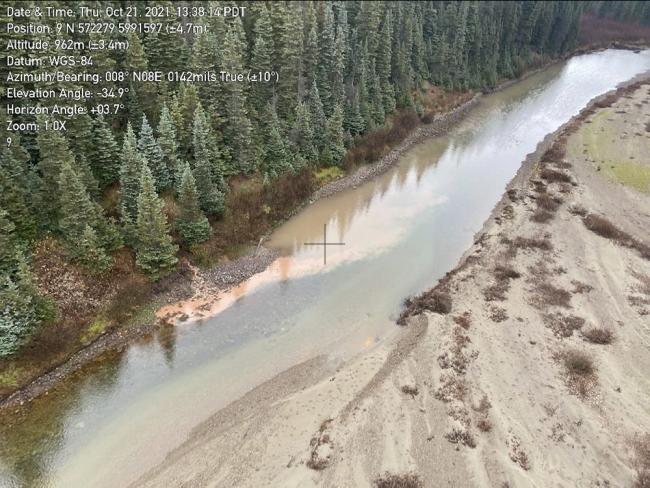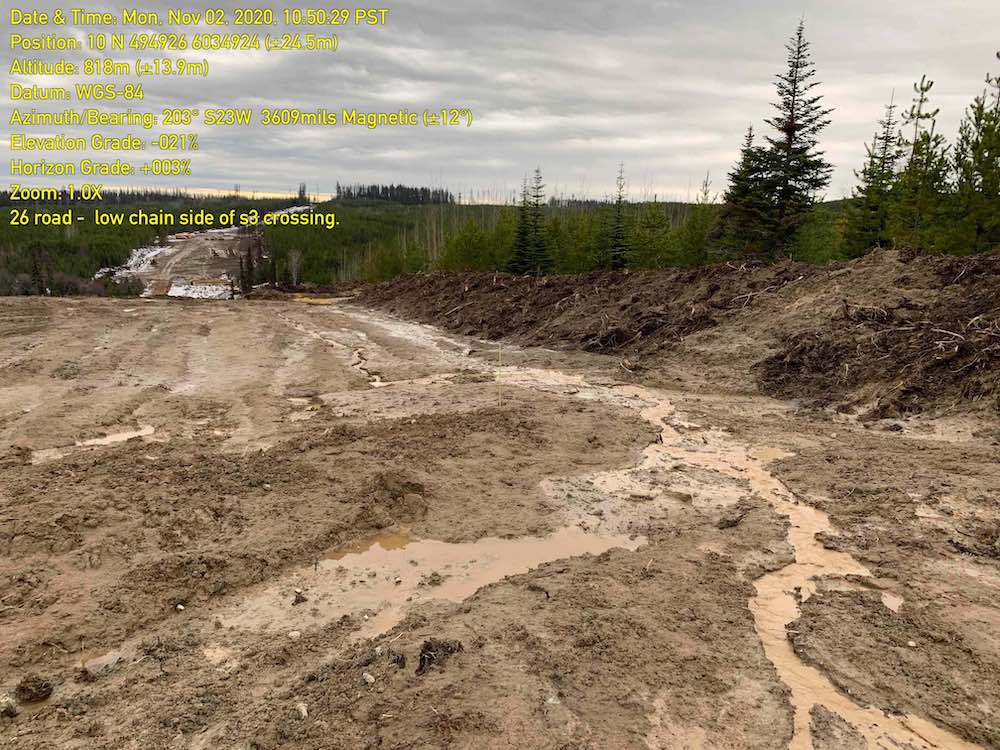Articles Menu

Feb. 25, 2022
Coastal GasLink has been ordered to pay a $72,500 fine for environmental violations that continued for at least a year along its 670-kilometre pipeline route through northern B.C.
While the fine is a result of erosion and sediment-control issues identified at multiple locations during inspections in April and May last year, the problems were first brought to light by B.C.’s Environmental Assessment Office in October 2020. They remained a year later, the EAO found in followup inspections.
In an email to The Tyee, a spokesperson for Coastal GasLink said the issues had been resolved by the time the penalty was issued this month.
The company blamed the scale of the project, the changing nature of erosion and sediment control, and the terrain the pipeline passes through for the challenges.
“Coastal GasLink is committed to the construction of the project in a safe and environmentally responsible manner,” it said. “Despite these challenges, Coastal GasLink is continuing to protect the environment and work towards compliance with the requirements of our regulators. Coastal GasLink continues to co-operate with the EAO and all other appropriate regulatory agencies to meet their requirements, standards, expectations and reviews.”
The pipeline has been at the heart of a high-profile conflict over Indigenous rights, as Wet’suwet’en hereditary leadership opposes the project through its traditional territory. The company and provincial government have pointed to benefit agreements signed between Coastal GasLink and five of the nation’s six band councils as support for the project.
At the centre of the conflict is a worksite near the Morice River, known to the Wet’suwet’en as Wedzin Kwa, where the company is preparing to drill its gas pipeline under the river.
In September, nation members and supporters evicted pipeline workers from the area and established a camp at the site. In November, RCMP enforced an injunction previously granted to Coastal GasLink and arrested 30 people over two days.
Last week, Coastal GasLink reported that masked assailants, some wielding axes, had threatened employees in a nighttime raid on the drill site, causing millions of dollars in damage to equipment.
Over the weekend, the company said it was working to contain the impacts from engine fluids that had spilled into the environment as a result of fuel lines severed during the incident.
It’s not the first time hydrocarbons have been released along the project corridor.
In May 2020, two diesel spills were reported at separate locations in the Morice area, one at a Coastal GasLink work camp and another at a remote RCMP detachment set up to police the pipeline conflict. Each spill was estimated at 500 litres.
Last August, two separate spills at the same Coastal GasLink work camp released up to 50 litres of diesel and 940 litres of diesel exhaust fluid into the environment just days apart.
The company has also been issued warnings for leaving food waste unsecured and failing to implement proper signage near environmentally sensitive features along the pipeline corridor.
However, the recent penalty levied against the project is tied to the company’s failure to prevent sediment from flowing into environmentally sensitive waterways.
The project’s erosion and sediment control issues were first identified by the province during inspections in October and November 2020, when EAO compliance and enforcement officers found the company was not complying with a condition of its Environmental Assessment Certificate that required it to implement an Environmental Management Plan.
An inspection report released in December 2020 found contractors weren’t complying with erosion-control measures in Coastal GasLink’s Environmental Management Plan, allowing sediment to flow into fish-bearing streams.
The report noted the company had not implemented mitigation measures in its erosion and sediment control plan and had failed to do more detailed planning to prevent pollution.
The EAO issued an order that required the company to control sediment flowing into waterways and hire an independent erosion and sediment-control auditor.
Coastal GasLink was also ordered to pay a $10,000 inspection fee at that time.
While initial inspections focused on 400 kilometres of the pipeline route to the north and east of Prince George, followup inspections last April and May took place at various locations between Chetwynd and Smithers. The EAO documented dozens of sites where sediment was seen flowing into watercourses and wetlands and where erosion and runoff control measures were not functioning or were overwhelmed.
At a location where the pipeline route skirts Gosnell Creek, a major tributary of the Morice, the report described how construction caused sediment to flow into an adjacent lake at “multiple locations.” It also found that the company had not posted signs to identify sensitive environmental features and that it had conducted inadequate streambank restoration.

In a report issued in September, the EAO recommended an administrative penalty under the province’s Environmental Assessment Act.
A month later, followup inspections again found that the company had still failed to comply with order EN2020-011. It recommended a second administrative penalty in December for continued violations.
That recommendation is still under review, a Ministry of Environment spokesperson said in an email to The Tyee.
Initially, the Ministry of Environment said penalties could run in the millions of dollars, with up to $750,000 imposed for each day Coastal GasLink remained out of compliance. It added that court-imposed penalties of up to $1 million for a first conviction and up to $2 million for subsequent convictions were also possible under the Environmental Assessment Act.
However, a ministry spokesperson later amended that figure, noting that the maximum fine for failing to comply with an order under the act is $100,000.
A 28-page administrative penalty assessment posted Wednesday by the EAO notes that the pipeline project crosses about 625 watercourses and other waterbodies, and many others are in close proximity to the route. It describes surfaces exposed to erosion, sediment-laden water flowing into streams and unmaintained sediment-control fencing at 26 locations along the 670-kilometre pipeline route.
“The nature of the contravention is considered to be moderate to major,” the assessment reads. “Non-compliance with the requirements of the Environmental Assessment Act… undermines the effectiveness of the act in addressing the adverse effects of regulated projects.”
The EAO’s assessment began with a base penalty of $62,500 and added $5,000 as a result of Coastal GasLink’s compliance history. It also increased the fine by $10,000 for the company’s repeated contraventions.
It declined to add to the fine for deliberate contravention, noting no evidence that the company had intentionally defied the act.
And while it had originally added $1,000 for economic benefit derived by the company as a result of the infractions, it reversed that decision based on responses from Coastal GasLink, which successfully argued that costs to remediate the issues outweighed any benefits.
It then reduced the amount by $5,000 based on actions the company said it was taking to correct the contravention.
The assessment also quotes from Coastal GasLink’s response to the EAO’s inspection record from last spring, which notes that beginning in January 2021 the company was under provincial health orders to reduce its workforce.
However, the EAO concluded that the non-compliances regarding erosion and sediment control did not stem from reduced workforce numbers and noted that issues along the project corridor pre-date the January 2021 provincial health order. It added that workforce restrictions were no longer in place at the time of the inspections in April and May.
“However, given the time frame that workforce restrictions were in place it is not unreasonable to conclude that the workforce restrictions may have impacted the ability of crews to fully comply,” it said.
Coastal GasLink recently graded its environmental record in an annual self-compliance report sent to the EAO in January.
While the company found it complied with most conditions, it noted “ongoing compliance concerns” related to erosion and sediment control and added the project had “minor non-conformances” with its Environmental Management Plan last year.
“Examples of both these minor non-conformances and identified non-compliances include issues related to: erosion and sediment control, animal attractants, waste management, signage, hydrocarbon management, spill prevention and response, secondary containment, watercourse reclamation and maintenance of electric fencing,” it said.
“Coastal GasLink finally notes that it continues to have compliance concerns associated with ESC at individual sites along the project. Coastal GasLink confirms that it is actively working to resolve identified ESC issues as they present and continues to plan activities to proactively mitigate these issues before they occur.”
Because Coastal GasLink’s fine exceeds $25,000, the company could request a review by the EAO’s chief executive assessment officer.
However, a spokesperson with B.C.’s Ministry of Environment confirmed in an email to The Tyee that the company had not done that before the seven-day window to request a review closed this week.
It has 30 days to pay the fine.
[Top photo: An image taken by enforcement officers with BC’s Environmental Assessment Office in October shows a muddy plume of water from a Coastal GasLink worksite entering the Clore River, east of Kitimat.]